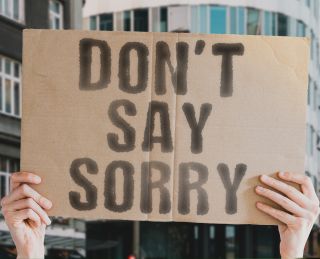Forgiveness
When Not to Apologize
High-conflict people rarely apologize, but they want you to.
Posted September 29, 2023 Reviewed by Tyler Woods
Key points
- Apologies are complicated when high-conflict people are involved.
- HIgh-conflict people often demand apologies when, in fact, others set reasonable limits on them.
- It's often better to explain what happened and commit to preventing it in the future.
Apologies can be a wonderful thing between reasonable people. They resolve many disputes very quickly. However, when high-conflict people are involved, it’s much more complicated.
High-conflict people generally have a pattern of behavior that includes a preoccupation with blaming others, a lot of all-or-nothing thinking, unmanaged emotions, and extreme behaviors that often offend others. While this is a description of conflict behavior, it is not a diagnosis. However, many people with high conflict personalities may also have traits of personality disorders, which may help explain their behavior in a conflict.

Cluster B Personality Traits
Cluster B personality disorders in the diagnostic manual of mental health professionals include borderline, narcissistic, antisocial, and histrionic personality disorders.1 They often display high conflict behavior, such as domineeringness, vindictiveness, and intrusiveness.2 Some people have traits of these disorders that don't reach the level of diagnosis but still display some high-conflict behavior.
People with borderline personality traits often have wide mood swings and may have sudden and intense anger at their romantic partners, family members, co-workers, and neighbors. Because of these behaviors, they often get into conflicts where others set limits on them (“You can’t talk to me that way or I will end this conversation”). They can’t see their part in the problem and are often offended by this.
People with narcissistic personality traits often have an arrogant and demeaning attitude toward those around them, which often includes romantic partners, co-workers, employees, friends, and family members. These behaviors tend to turn into conflicts in which the other people are tempted to insult them back or try to ignore them, both of which offend them.
People with antisocial personality traits can be very aggressive and frequently lie about almost anything, in any setting. This tends to intimidate those around them and lead to challenges of their truthfulness, which may also offend them.
People with histrionic personality traits can be dramatic and exaggerate what others have done. This can escalate them into conflicts with those around them.
Demanding Apologies for Appropriate Behavior
Since high-conflict people are offended by a setting of boundaries. It’s not unusual for them to demand an apology from the other person, even if that person is being very appropriate. They may apply all-or-nothing thinking and refuse to do anything (like their share of the work or seeking a solution to a problem) until the other person apologizes. However, that is not likely to happen. Reasonable people should certainly not apologize for reasonable behavior. This just encourages unrealistic expectations from those with high-conflict personalities and rewards them for their inappropriate behavior.
Demanding Apologies for Inappropriate Behavior
On the other hand, reasonable people can also be offended by the inappropriate behavior of high-conflict people and demand that they apologize for their truly offensive behavior. While this may seem appropriate, it is also very unlikely to happen. Generally, high-conflict people lack the ability to reflect on their own behavior and feel justified in whatever they have done. Therefore, they won’t apologize regardless of how reasonable it may seem to everyone else around them. It is not recommended to make this a stand-off, as high-conflict people can often be more stubborn than everyone else. Another approach is needed.
What Can Be Done?
High conflict people are stuck in the past. This means there are generally two approaches to avoiding such an apology stand-off. (I call it apology quicksand.) One approach is to focus on the future and discuss what can be done in a similar situation. “What would you like me to do in the future if I am concerned about the way you are speaking to me? Do you have any suggestions?”
Another approach is to accept that the high-conflict person may never apologize and let go of that as a demand. One may instead choose to steer clear of that person in the future or lower one’s expectations for how they will behave in whatever relationship you are in, such as at the workplace or with a relative.
Mediating a Conflict
When someone is mediating a conflict, either formally, as in a legal dispute, or informally, as in a family situation, it helps to start the discussion by saying that we are going to focus on the future rather than mediate the past.
Then, if one person demands an apology and the other does not instantly give it, you can say, “Actually, apologies are about the past, and this discussion is about what to do going forward. We can’t change the past, but we can choose the future. What do you propose we do in a similar situation in the future?” This approach nips the stand-off in the bud and has proven effective in many mediations (in my 40 years of experience of doing mediations). Such an approach shifts the discussion to topics of the future that they can do something about.
What if You Should Apologize?
Sometimes, we make mistakes when dealing with high-conflict people. The trouble is that if you apologize for something small, their all-or-nothing thinking will turn it into a huge apology. “See, she admitted that it’s all her fault. She even wrote it here in an email.” I have seen domestic violence perpetrators carry around crumpled pieces of paper for months or years with their victim/survivor's written apologies on them (obviously to try to calm them down) as proof it’s “all” the victim/survivor's fault. If you're truly sorry for something, rather than say "I'm sorry" to such a high-conflict person, it’s often better to find another way to explain what happened or commit to making sure it will never happen again.
References
1. American Psychiatric Association (APA): Diagnostic and Statistical Manual of Mental Disorders, Fifth Edition, Text Revision. Washington, DC, American Psychiatric Association, 2022, 734.
2. Wilson S., Stroud, C. and Durbin, C. Interpersonal Dysfunction in Personality Disorders: A Meta-Analytic Review, Psychology Bulletin, July 2017; 143(7): 677-734. doi: 10.1037/bul0000101.




